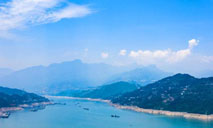Heed the call of the climate and athletes
Athletes around the world have been waiting an extra year to prove their mettle, to savor that sweet smell that comes only with success, to bask in that ultimate glory called the Olympic Games.
The Tokyo Games was deferred because of the novel coronavirus, which has devastated lives, destroyed livelihoods, orphaned thousands of children, shattered communities, especially the poorest among them, and laid bare the glaring loopholes, which we tended to ignore, in the healthcare sectors of country after country.
The pandemic has also crushed the dreams of many athletes who aspired to rise above their poverty by excelling in their discipline. Many such stalwarts would still be nursing their ambitions in the hope that the Tokyo Olympics would, after an agonizing 12 months' wait, give them that one opportunity they need to build their lives.
Indeed, they deserve a chance. Yet the hurdles they face are a lot tougher than the 400-meter hurdles, steeplechase, triathlon, decathlon or the marathon in the shape of climate change. The Games is to be held from July 23 to Aug 8, but a report by the British Association for Sustainable Sport is cause for alarm. The Tokyo Olympics is set to be a sizzler with average temperatures hovering around 35 degrees Celsius and humidity fluctuating between 60 and 80 percent, making the Games perhaps the hottest sports event ever staged.
Many may argue that temperatures touch 40 C during the Australian Open, but the tennis championship involves fewer than 150 athletes whereas more than 10,000 athletes are expected to take part in the Tokyo Games-the figure for the 2016 Rio Olympics was over 11,000-that too in the midst of a pandemic.
As the report says, Tokyo's average annual temperature "has increased by 2.86 degrees Celsius since 1900, more than three times as fast as the world's average", and the Games is set to be held at a time when Japan is experiencing its highest temperatures, which are likely to be even higher this year thanks to climate change. Lest we forget, the past six years have been the hottest on record, with 2018, 2019 and 2020 being the top three.
That brings us to one of the brightest stars on the tennis horizon, a four-time Grand Slam winner. After beating no other than Serena Williams in the 2018 US Open final, Naomi Osaka has gone on to win the Australian Open twice, and the US Open a second time. This should leave no doubt that she is tough, can weather any storm on the tennis court. And yet she pulled out of the ongoing French Open because she couldn't take the pressure of fielding journalists' inane, tedious questions at the after-match news conferences so important to TV channels and sponsors to make more money.
It is these very sponsors and advertisers which stipulate the Games be held in July or August-because it's the favored slot for TV networks. For the uninitiated, Tokyo hosted the 1964 Games in the cooler month of October.
Of course, we can argue that today's top athletes should be capable of handling the pressures that come with fame and fortune. Some may even view the top athletes as snobbish and overpaid. True, quite a few of them are spoiled and arrogant, but quite a few of them are introverted, anxious individuals, as Osaka has said of herself.
Imagine the immense pressure Osaka will be under at the Tokyo Games to win the tennis gold, all the while battling the pressures of keeping the virus at bay and coping with the high temperature and humidity. There'll be many like her at Tokyo, under the gaze of their fellow countrymen and women. Not to mention the thousands of coaches and officials, and journalists.
Sports events like the Olympics, the World Cup, the World Championships, are no longer only about sports. They are more about TV channels, advertisers, sponsors and billions of dollars-about profits.
No doubt these athletes have more stamina and endurance than John Doe. But excelling in sports is one thing, and having the capacity to bear the heat another. It's high time we realized athletes, despite being stronger, faster and healthier than the average person, are still human, not superhuman. More important, they are not commodities to be bought and sold in the market that the realm of sports has become.
The author is a senior editor with China Daily.
Photos
Related Stories
Copyright © 2021 People's Daily Online. All Rights Reserved.










